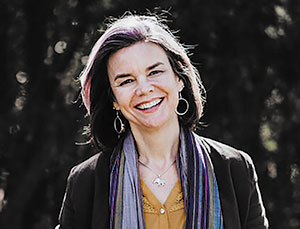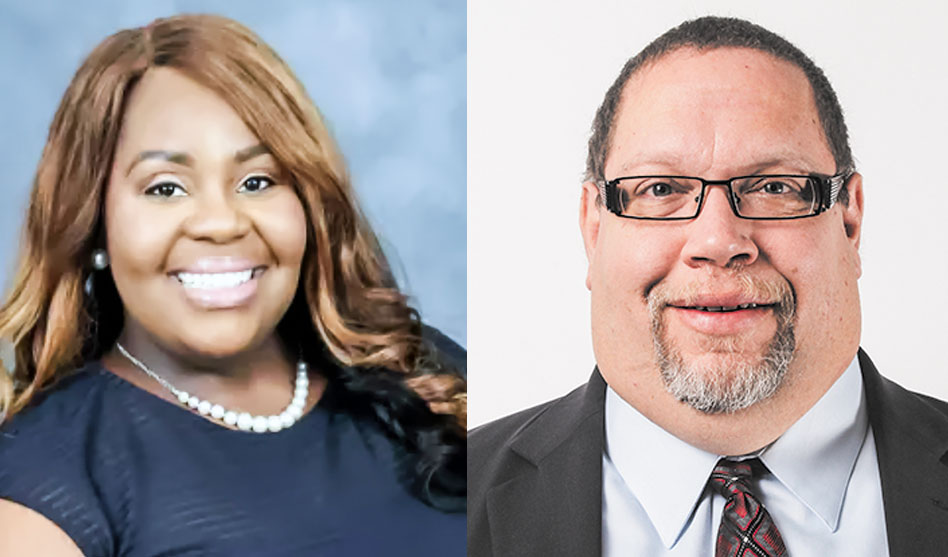Danyell Watkins, left and Rafael McDonnell
Advocates cautiously hopeful for progress in the district
JAMES RUSSELL | Contributing Writer
james.journo@gmail.com
The Mansfield Independent School District heard the results of an equity audit at their Tuesday, Feb. 23 meeting, and the report revealed what many advocates for years: The district has a lot of room for improvement when it comes to inclusivity.
The district has a lot of room for improvement when it comes to inclusivity.
The audit was conducted by Texas Association of School Administrators and Curriculum Management Solutions Inc. late last year and announced a month after the district hired Danyell Wells, its first director of diversity, equity and inclusion. Administrators, teachers, parents and students contributed to the survey.
According to the executive summary, the research team’s guiding principles centered on the following question: How is Mansfield ISD supporting and assuring equity and equality in its treatment of and services to students? Those four guiding principles included enhancing vision and policy, academic achievement, equity and access, culture and climate and curriculum.

the Rev Katie Hays
Among those recommendations were clearly defining expectations and direction for equity and inclusion, closing opportunity gaps for low income students and students of color, stronger systems of intervention for at-risk students, a more diverse curriculum and addressing so-called “cultural blindness.”
LGBTQ identities span race, ethnicity and economic status, but, according to some respondents, homophobia on campuses is common.
“If making fun of someone because of their sexual orientation is bad, then our school is bad. And honestly, I don’t think anyone really cares, and that is disappointing,” said one high school student.
Another reported being very uncomfortable with “students being very ignorant, homophobic or even blatantly racist.”
A middle school student had strong words for classmates and teachers: “I still see homophobia and racism everywhere, and it tires me that I don’t see anyone standing up for the victims. I wish people were held accountable for their wrongdoings, instead of [being] praised.”
The summary was more explicit about the district’s defects than the presentation, said Rafael McDonnell, Resource Center’s communications and advocacy manager.
“If you look at it, a lot of it says what advocates have been telling the district for years in terms of climate and policy. It’s a vindication,” he said if the study.
McDonnell is just one of the advocates for policy changes in the district. The Rev. Katie Hays from LGBTQ-affirming Galileo Church in Kennedale has been another as part of the Mansfield Equality Coalition, a coalition of activists who have called for policy changes in the district addressing inequities.
“We’re not advocating for programming. We’ve only asked for policies protecting LGBTQ people,” Hays said.
Of the audit, she said was heartened, “But the tendency of that board is to gloss over any indication of suffering.”
Activists for changes have not made much progress, however, since the Mansfield school district drew activists’ ire in 2017 when MISD placed art teacher Stacy Bailey on administrative leave following parents’ complaints that she was promoting the “gay agenda.” Her “gay agenda” was sharing photographs of her family, including her then-fiancé/now-wife Julie Vazquez, with students.
One student mentioned Bailey sharing the photo to her mother, and the mother filed a complaint. School district officials said parents complained about Bailey’s statements to the children, not her sexual orientation. They defended the district by claiming it has many gay employees and doesn’t discriminate.
But when Bailey requested the school district add sexual orientation and gender identity and expression to its non-discrimination policy, the district refused.
While her contract with the district was ultimately renewed in 2018, Bailey was reassigned to a secondary school. She then filed a lawsuit against the district claiming discrimination based on her sexual orientation.
Bailey won the lawsuit in February 2020, and among her settlement requirements was one forcing the board to vote on adding gender identity and sexual orientation to its nondiscrimination policy.
One week after the U.S. Supreme Court ruled that “sex” includes sexual orientation and gender identity protections under Title VII of the Civil Rights Act, in the historic Bostock v. Clayton County case, the board did indeed vote on amending the policy: They unanimously rejected it.
That was despite a guidance issued by the Texas Association of School Boards about inclusive language in light of Bostock.
Mansfield ISD is one of only a handful of school districts in North Texas that has not adopted the language, according to McDonnell. The others are Grapevine-Colleyville ISD in northeast Tarrant County and Highland Park ISD in Dallas.
“It’s been a long and winding mess,” McDonnell said.
Both Hays and McDonnell are now watching what steps, if any, the district takes after this presentation. “Will they take the information and adopt new policies? Or treat it like [The Ark of the Covenant in] Raiders of the Lost Ark and put in a filing cabinet?” McDonnell asked.












